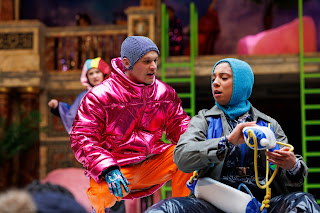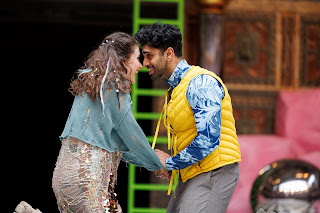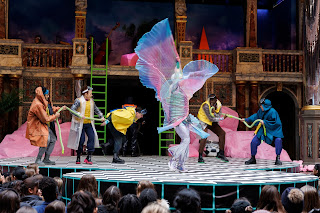Who it turns out doesn't actually much like The Tempest*, but as someone who's spent the last three decades repeatedly booking to see the Shakespeares I don't like because once in a blue moon one will surprise you, I was never going to think this was much of an argument against it.
So a ship runs aground on an apparently deserted island on the way back from a Royal wedding. Unbeknownst to the various parties on board, a magician lives there, and not only did he cause the storm that shipwrecked them, but he's Prospero (David Hartley,) the deposed Duke of Milan. Some of those on board betrayed him, and he wants revenge; others will form part of his plan to return to power. Elsewhere on the island, Prospero's disgruntled slave Caliban (Archie Rush) meets a couple of drunks who also came off the ship, and plots with them to take down his master.
With the text edited down the focus is on telling the story and getting laughs, with little time to get sidetracked by radical reintepretations of the play. But I've got to say Page's production is just so impressive at both getting the basics done, and giving strong and specific interpretations to the characters that make the show well worth seeing in its own right. So, with most of the scenes where he tortures people for the LOLs cut, Hartley's Prospero does come off a bit gentler, but I still got a real sense of the way Ariel (Charlie Cameron) is frustrated by the way he constantly, smugly offers up her freedom as a reward for her service when (a) he's already sworn to do this so there's nothing magnanimous about it and (b) he's the one who enslaved her in the first place.
Rush's Caliban is very much a stroppy teenager with no signs of the monster he's described as; putting him in a similar sparkly skullcap to Ariel suggests he's essentially another similar magical creature of the island, the main difference between them being that he's a lot less pliant to Prospero. His scenes with Bea Svistunenko's Trinculo and Aoife Gaston's Stephano are very funny - I particularly liked Gaston trying to drunkely drag herself onto the stage before realising the steps were right next to her. Svistunenko and Azan Ahmed have drawn the short straw, character-wise, but they still manage to get some personality into Miranda and Ferdinand, with some funny work in the log-carrying scene.
Meanwhile kudos to Zheng Xi Yong's Antonio, Lloyd McDonagh's Sebastian and David Ijiti's Gonzalo for fleshing out characters whose scenes feel like they've been cut more than most, and bringing laughs to scenes that don't always manage them; while Emma Manton brings some genuine pathos as Alonso mourns the son she thinks she's lost. And apart from the character work the interesting little ideas continue throughout the afternoon: As well as the pronoun changes to reflect the casting, there's also a throwaway reference to the ship having been on the way back from a lesbian wedding; and at the end Prospero, in perhaps an acknowledgement of his past sins, asks Ariel and Caliban to set him free instead of the audience. (A twist that probably would have worked better if one of the stewards hadn't immediately, loudly started the applause, robbing us of a potential final moment of awkward silence.)
This was a captioned and BSL interpreted performance, something I'd presumably seen when I booked it and then forgotten about. So when I saw William Grint on stage I was surprised because I hadn't seen his name in the cast list, but it turns out he was there as one of the interpreters. Given there's only a couple of BSL shows it's admirable how much work has been done to integrate them into the performance rather than keeping them off to the side (including Grint being magically sent off to sleep along with Alonso and Gonzalo.) The Globe, aided perhaps by its generally playful performance style, has become such a leading light in integrating BSL into the show rather than just interpreting from the sides, so as well as providing a useful service for people who need them, for those who don't they quickly stop being a distraction, except for those moments where they actively add to the enjoyment of a scene.
The Globe has done quite well with The Tempest in the last year. Page actually co-directed Sean Holmes' production last summer so I don't know if working on it again so soon has helped with this version's success - maybe she was fresh with ideas she wanted to try on the play, and steeped enough in its world to easily bring them out. In any case this makes a strong case for textually stripped-back Shakespeare, as it's very effectively found what works best in the play, while still leaving some room for nuance.
Yes OK, so I still spent some of the review ranting about how awful Prospero is.
The Tempest by William Shakespeare is booking in repertory until the 15th of April at Shakespeare's Globe.
Running time: 1 hour 40 minutes straight through.
Photo credit: Ellie Kurttz.
*she studied it at school and the way she tells it, I think her issue is with Caliban, because she was initially very sympathetic to him before realising he may have sexually assaulted Miranda. Which sounds a lot like the way my understanding of the play developed as well, but the more productions of it you see the more you make the next logical leap, which is just how much Prospero controls the narrative.







No comments:
Post a Comment